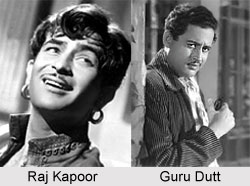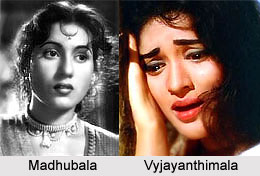 Golden era of Indian cinema saw the release of some of the excellent and memorable cinemas in Bollywood. The outbreak of the Second World War in 1939 shifted the spotlight to the actors who were not only heavily paid but also as a result started their own companies. The directors like Mehboob, Bimal Roy, Guru Dutt and Raj Kapoor entered the film industry during the 1930s and 1940s, which were traumatic years for the Indian people. The fight for independence, famines, changing social mores, and global fight against fascism all contributed to the ethos in which the directors grew up. However, the 1950s saw the rise of these great directors, who changed the fate of Indian cinema.
Golden era of Indian cinema saw the release of some of the excellent and memorable cinemas in Bollywood. The outbreak of the Second World War in 1939 shifted the spotlight to the actors who were not only heavily paid but also as a result started their own companies. The directors like Mehboob, Bimal Roy, Guru Dutt and Raj Kapoor entered the film industry during the 1930s and 1940s, which were traumatic years for the Indian people. The fight for independence, famines, changing social mores, and global fight against fascism all contributed to the ethos in which the directors grew up. However, the 1950s saw the rise of these great directors, who changed the fate of Indian cinema.It is the post independence period that saw the golden era of Indian cinema with melodious socials and melodramas, which made the Actors and the Actresses a household name. Raj Kapoor (RK Films) was one example. Awara, made by Raj Kapoor set the agenda for popular commercial cinema and was a hit within India as well as overseas. After Raj Kapoor, Dev Anand set up Navketan in 1949 with his brother Chetan Anand. The studio system however was not wiped off and Mehboob Khan (Mehboob Productions), Kidar Sharma and Bimal Roy proudly held aloft the banner.
 Films with various themes were now being made. The theme of lost brothers was being repeated (as many as 50 films). Side by side went on the tear-jerking melodrama, mostly in the films of the genre of Meri Behan, Choti Behan and the like. The humble position of the Indian bride was highlighted in pictures like Gumasta (1951) and the decoity aspect in films like Ganga Jammuna, Jis Desh Mein Ganga Behti Hai and Mujhe Jeena Do. In recent years this has produced a veritable harvest of crude dacoit films, spurred on by the spectacular success of Sholay.
Films with various themes were now being made. The theme of lost brothers was being repeated (as many as 50 films). Side by side went on the tear-jerking melodrama, mostly in the films of the genre of Meri Behan, Choti Behan and the like. The humble position of the Indian bride was highlighted in pictures like Gumasta (1951) and the decoity aspect in films like Ganga Jammuna, Jis Desh Mein Ganga Behti Hai and Mujhe Jeena Do. In recent years this has produced a veritable harvest of crude dacoit films, spurred on by the spectacular success of Sholay.Starting from Nitin Das's Chandidas, the inter-caste issue, especially in relation to the lower, depressed untouchable castes, has found reasonably good expression. Shantaram's Dharmatma, Chandulal Shah's Achhoot, Bombay Talkies Achoot Kanya, Bimal Roy's Sujata, Vasant Joglekar's Prarthna and Abbas Char Dil Char Rahein. The rural urban contrast has provided another theme for numerous films, generally favouring the village over the town.
For more, visit the link below: